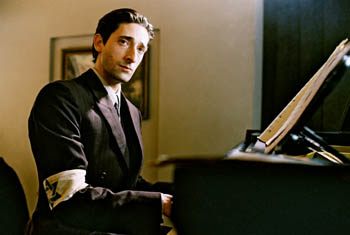![[Metroactive Movies]](/movies/gifs/movies468.gif)
[ Movies Index | Show Times | Silicon Valley | Metroactive Home | Archives ]
Keyed Up
Roman Polanski's 'The Pianist' is a chilly, inspired epic of the Warsaw ghetto
By Richard von Busack
YOU LEARN so much from Roman Polanski's new movie, The Pianist, that a certain law of film--that a movie should have a proactive hero--doesn't apply. The Pianist is based on the memoir of Wladyslaw Szpilman, a noted Polish classical pianist who survived the Holocaust. He made it through, not because of his ability to fight, but because of a fortunate string of accidents. Szpilman spent the length of the war in various closets and sealed-off flats; at one point in the film, he sleeps cramped in a cold fireplace, wedged in by a bookcase next to some live ammo and mortar shells.
Wladyslaw (Adrien Brody, in his most subtle performance) has one strong characteristic. His solitude as a classical musician helps him--barely--to survive this nerve-racking isolation, particularly when he's like a ghost haunting a cleared-out city. The word "heroism" has no meaning in such a deadly situation. The moral of The Pianist is "God wants us to survive. At least that's what we have to tell ourselves."
During the German blitz, Wladyslaw is recording Chopin for the Polish radio. A bomb blast breaks open the studio, signaling the arrival of the Nazis. The occupation begins with a series of nuisance laws and ends with the formation of an official ghetto on Halloween 1940--360,000 people crowded into a tiny area of the city. Keeping his carefree manner as best he can--he's no firebrand, Wladyslaw--he provides for his relatives by playing dinner music for the profiteers in a cafe. (The insiders who made money off the ghetto are usually neglected in films about the Holocaust.)
Matters worsen, which we see, as if out of the corner of our eyes: dead bodies on the sidewalk are discreetly covered up with newspapers; a beggar steals an old lady's soup--when it spills, the starving man laps it off the street like a dog. After the Final Solution is implemented, the ghetto empties. Wladyslaw is saved by a music fan and hidden; shuffled from place to place. Through his windows, he witnesses the Warsaw ghetto uprising; when he's kicked out of his last hiding place, Wladyslaw hides on the streets until the final triumph of the Polish people over their tormentors.
This story of raw survival is not sweetened until the end, when a German officer (Thomas Kretschmann) gets a free concert on a perfectly tuned piano exposed to the Polish winter, played flawlessly by a half-dead musician. Polanski is best known for Rosemary's Baby and Chinatown, but his later work--such as Death and the Maiden, his scarifying revenge drama about Pinochet's Chile; or his sardonic sex comedy Bitter Moon (a smart alternative to Fatal Attraction)--is far too little seen. Polanski, who as a child escaped from the Kracow ghetto, caps his career with this technical triumph of reconstructing long-vanished wartime landscapes. Even working on a massive canvas, Polanski is masterful at conveying his career-long fascination with the way human beings randomly help or hurt one another. And he defies something that needs defiance: that terrible fallacy that war brings out the best in people.
[ Silicon Valley | Metroactive Home | Archives ]
![]()

On the Chopin Block: Polish pianist Wladyslaw Szpilman finds himself on the run when the Nazis take over Warsaw.
The Pianist (R; 148 min.), directed by Roman Polanski, written by Ronald Harwood, based on the book by Wladyslaw Szpilman, photographed by Pawel Edelman and starring Adrien Brody, opens Friday at the Los Gatos Cinema.
Send a letter to the editor about this story to letters@metronews.com.
From the January 1-8, 2003 issue of Metro, Silicon Valley's Weekly Newspaper.